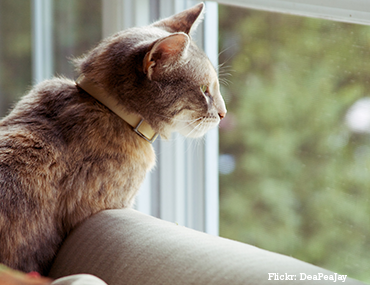
For more from Dr. Ernie Ward, find him on Facebook or at www.drernieward.com.
Full disclosure: I’m a believer in using nutrition as a healing tool. I take several nutritional supplements, give them to my family, and recommend them to my patients. Because there aren’t as many scientific studies conducted on nutritional supplements, especially in veterinary medicine, I take a lot of flak from my colleagues whenever I espouse trying a different diet, food, or supplement. A new study on cats demonstrates that a popular supplement used to enhance the immune system works.
Massey University’s Institute of Food, Nutrition and Human Health performed the study. If you’re not familiar with Massey University, that’s probably because you’re not from New Zealand. Before you debunk this as coming from an insignificant island south of nowhere, keep in mind the Kiwis gave us the eggbeater, the referee whistle, and the world’s safest no-springs trampoline. And they play a mean game of rugby. You’d better respect the Maori!
Researchers wanted to evaluate the effects of certain dietary supplements on the feline immune system. Because the immune system helps keep our kitties clear of disease and infection, this is kind of a big deal. The study assessed the function of a very important immune cell, the T lymphocytes, when cats were fed diets with or without l-arginine added. Arginine is known to aid in wound healing, kidney function, and maintaining strong immune and hormonal systems. It may also help with heart function and improve blood flow. Arginine is naturally found in red meats, fish, poultry, grains, nuts and seeds. Would adding arginine to a cat’s diet improve its health?
Forty-three cats were studied during a five-week period. One group was fed a plain low-protein (22.7% dry matter (DM) basis); another with the same diet plus yeast-derived nucleotides, salmon oil, or l-arginine, and a final group was fed a commercial high protein diet (53% DM basis) without any additives. The results were surprising only to those thatchose not to believe in the healing power of foods.
 The plain diets showed no boost in T lymphocytic function. Cats fed the supplemented diets demonstrated a significant increase in immune function. Cats receiving additional arginine fared best followed by the nucleotide and salmon oil groups. The scientists concluded that “a number of dietary ingredients have the ability to modulate the immune system of healthy cats possibly resulting in a greater ability to fight infection and disease.”
The plain diets showed no boost in T lymphocytic function. Cats fed the supplemented diets demonstrated a significant increase in immune function. Cats receiving additional arginine fared best followed by the nucleotide and salmon oil groups. The scientists concluded that “a number of dietary ingredients have the ability to modulate the immune system of healthy cats possibly resulting in a greater ability to fight infection and disease.”
What’s really exciting about studies like this one is the fact that more researchers are seriously, and critically, looking into natural solutions for disease and illness. I readily admit that this study could’ve been conducted more rigorously. It’s extremely easy to dismiss this sort of research, even when published in respected peer-reviewed journals such as Veterinary Immunology and Immunopathology. Studies of natural remedies are often poorly funded and typically taken on by a passionate and curious investigator. Kudos to the Kiwis!
If you’re a natural-healing type, I encourage you to discuss arginine supplementation for your cat, especially if it suffers from chronic infections or immunosuppression.1 Dosing is made on a cat-by-cat basis so collaboration with your veterinarian is critical to ensure both safety and efficacy. There are other beneficial supplements that may help your ailing pet in addition to arginine. Keep an open mind, have candid conversations with your vet, and be thankful for New Zealand, even though they’re responsible for the Zorb – that crazy big plastic ball you climb in and roll down a hill in.
1. As always, we advocate discussing all medical advice provided on Pet Health Network with your veterinarian. He or she is the best resource when it comes to decisions about your pet's health.
